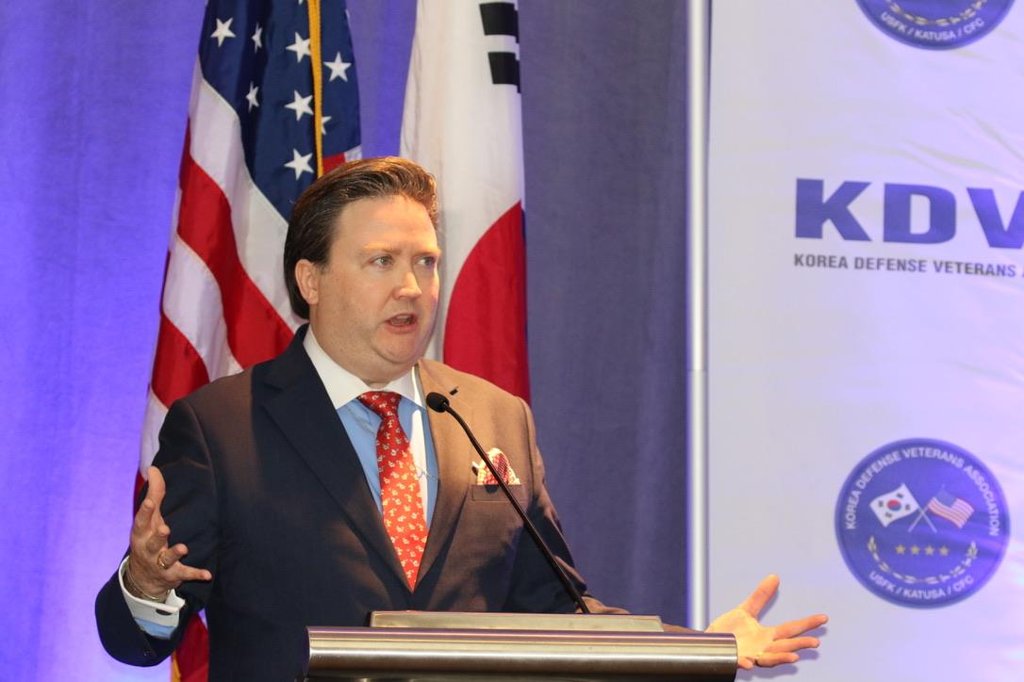- California Assembly OKs highest minimum wage in nation
- S. Korea unveils first graphic cigarette warnings
- US joins with South Korea, Japan in bid to deter North Korea
- LPGA golfer Chun In-gee finally back in action
- S. Korea won’t be top seed in final World Cup qualification round
- US men’s soccer misses 2nd straight Olympics
- US back on track in qualifying with 4-0 win over Guatemala
- High-intensity workout injuries spawn cottage industry
- CDC expands range of Zika mosquitoes into parts of Northeast
- Who knew? ‘The Walking Dead’ is helping families connect
U.S., S. Korea coordinated closely over N.K. leader’s ‘disappearance’: official
The United States and South Korea were in close coordination over North Korean leader Kim Jong-un’s recent disappearance from public view, a State Department official said Tuesday.
The comment by Marc Knapper, deputy assistant secretary of state for Korea and Japan, suggests that the allies jointly sought to verify unconfirmed reports that Kim was seriously ill or possibly dead, and may have looked into options in the event the reports turned out to be true.
“I’d say, you know, without getting into too much detail, the most recent curiosity involving the disappearance of Kim Jong-un definitely invited a lot of good, close info-sharing and coordination between us and our colleagues in both Seoul and in Tokyo,” Knapper said during an online event hosted by the Center for Strategic and International Studies.
“You really realize again that in moments like this, alliances count, friendships count. And I think the United States benefits tremendously from these alliances we enjoy, and certainly going forward,” he said.

This file photo shows U.S. Deputy Assistant Secretary of State for Korea and Japan Marc Knapper. (Yonhap)
There was intense speculation surrounding the whereabouts and health of Kim after he skipped an annual commemoration of the birthday of his late grandfather and North Korea founder Kim Il-sung on April 15.
He reemerged in North Korean state media reports on Saturday, sporting a broad smile as he attended the completion ceremony of a fertilizer plant in Sunchon, north of Pyongyang.
A North Korea without Kim would have raised serious questions about regional security and stability, with no known succession plans in the dynastic regime and a nuclear arsenal at large.
Denuclearization negotiations between Washington and Pyongyang resumed in earnest in 2018 but have since stalled due to differences over how to match the North’s denuclearization steps with U.S. concessions, such as sanctions relief.
“As far as the United States is concerned, we remain open to diplomacy, regardless of whatever conclusions Pyongyang has drawn,” Knapper said.
“The door to diplomacy remains open. We remain committed to fulfilling the promise of the 2018 Singapore statement, and we look forward to being able to sit down once again with the North,” he said, referring to the agreement reached between U.S. President Donald Trump and Kim during their first summit in Singapore in June 2018.
“We are committed to diplomacy, committed to a peaceful resolution of tensions there, committed to resolving their nuclear and their missile programs,” Knapper added.
On the defense cost-sharing negotiations between Seoul and Washington, he declined to offer details, citing policy not to discuss them in public.
“Our leaders have spoken recently, and we’ll continue to look for ways to sit down and talk,” he said, noting that the coronavirus pandemic has made it difficult for negotiators to meet face to face.
“Suffice to say that I think we believe our side has been very flexible up until now. And we’re looking for some flexibility on the part of the Korean side too,” he said.
Washington has demanded a significant increase in Seoul’s financial contribution to the upkeep of 28,500 American troops stationed on the peninsula.
Citing the absence of a new cost-sharing deal, U.S. Forces Korea last month placed some 4,000 South Korean employees on unpaid leave.












